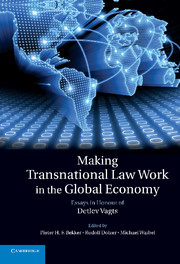Book contents
- Frontmatter
- Contents
- List of contributors
- Foreword: the transnationalism of Detlev Vagts
- List of cases cited
- List of abbreviations and acronyms
- Introduction: a Festschrift to celebrate Detlev Vagts' contributions to transnational law
- 1 Detlev Vagts and the Harvard Law School
- 2 Constructing and developing transnational law: the contribution of Detlev Vagts
- I International law in general
- II Transnational economic law
- III Transnational lawyering and dispute resolution
- 23 Diffusion of law: the International Court of Justice as a court of transnational justice
- 24 Regulating counsel conduct before international arbitral tribunals
- 25 International arbitrators as equity judges
- 26 Customary international law, Congress and the courts: origins of the later-in-time rule
- 27 Mediation and civil justice: a public–private partnership?
- 28 The borders of bias: rectitude in international arbitration
- 29 Managing conflicts between rulings of the World Trade Organization and regional trade tribunals: reflections on the Brazil – Tyres case
- 30 Cross-border bankruptcy as a model for the regulation of international attorneys
- Bibliography of Detlev Vagts
- Index
28 - The borders of bias: rectitude in international arbitration
from III - Transnational lawyering and dispute resolution
Published online by Cambridge University Press: 17 November 2010
- Frontmatter
- Contents
- List of contributors
- Foreword: the transnationalism of Detlev Vagts
- List of cases cited
- List of abbreviations and acronyms
- Introduction: a Festschrift to celebrate Detlev Vagts' contributions to transnational law
- 1 Detlev Vagts and the Harvard Law School
- 2 Constructing and developing transnational law: the contribution of Detlev Vagts
- I International law in general
- II Transnational economic law
- III Transnational lawyering and dispute resolution
- 23 Diffusion of law: the International Court of Justice as a court of transnational justice
- 24 Regulating counsel conduct before international arbitral tribunals
- 25 International arbitrators as equity judges
- 26 Customary international law, Congress and the courts: origins of the later-in-time rule
- 27 Mediation and civil justice: a public–private partnership?
- 28 The borders of bias: rectitude in international arbitration
- 29 Managing conflicts between rulings of the World Trade Organization and regional trade tribunals: reflections on the Brazil – Tyres case
- 30 Cross-border bankruptcy as a model for the regulation of international attorneys
- Bibliography of Detlev Vagts
- Index
Summary
La raison et le jugement viennent lentement; mais les préjugés accourent en foule.
Jean-Jacques RousseauIntroduction
Detlev Vagts continually impresses us with the serious clarity by which he interweaves the precise details of a complicated fact pattern with a broader analysis of their legal and policy implications. The catalogue of his learning includes mainline concerns like corporations and taxation, innovative tools for teaching international business law and historical analysis on the wartime comportment of neutrals or the legal system of the Third Reich.
Professional rectitude has also found its way into the scholarly territories where Detlev has left his intellectual footprint. His service as Chair of a Task Force on legal ethics led him to address several aspects of ethics for both adjudicators (judges and arbitrators) and lawyers (advocates and advisers). With characteristic insight, he sensed that small study groups and legal education programmes commended themselves as an essential preamble to guidelines and codes, but only ‘when the time is ripe’.
In the spirit of that work on professional ethics, this brief contribution to the honour of Vagts' scholarship looks at some of the salient deontological problems that implicate international arbitration, particularly when individuals move between roles as arbitrators and advocates. The modest hope is not to fix standards (the time is not ripe), but to take the first step of identifying issues and perhaps signalling some wrong directions and problematic solutions.
- Type
- Chapter
- Information
- Making Transnational Law Work in the Global EconomyEssays in Honour of Detlev Vagts, pp. 577 - 600Publisher: Cambridge University PressPrint publication year: 2010



